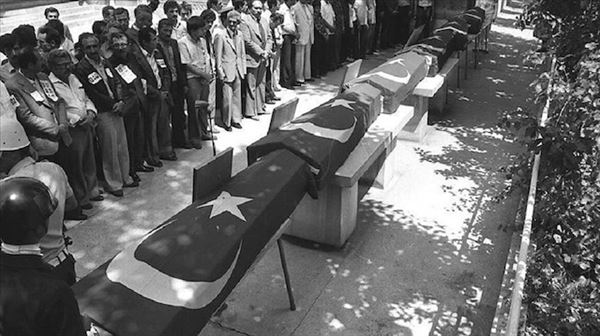Armenian terror organizations have martyred 31 Turkish diplomats and family members since the 1970s. According to data compiled by Anadolu Agency, a t
Armenian terror organizations have martyred 31 Turkish diplomats and family members since the 1970s.
According to data compiled by Anadolu Agency, a total of 77 people — 58 of them Turkish citizens, including 31 diplomats and members of their family — lost their lives in attacks carried out by these terror organizations.
The vast majority of the attacks were conducted by the Armenian Secret Army for the Liberation of Armenia (ASALA) and the Justice Commandos of the Armenian Genocide (JCAG).
ASALA, founded in 1975, was the first Armenian terrorist organization to wage war against Turkey.
It not only targeted Turkey but also other countries and became infamous for a bomb attack on the Beirut office of the World Council of Churches in 1975.
The JCAG was formed in 1975 in Beirut. However, it is nationalistic, not Marxist-Leninist like ASALA.
Claiming that it only received support from the Armenia diaspora rather than foreign partners, JCAG only targeted Turkey because it believed that attacking other countries would damage the so-called “Armenian struggle.”
It initially gained notoriety by claiming responsibility with ASALA for an attack on Turkey’s Ambassador in Vienna Danis Tunaligil on Oct. 22, 1975.
Trail of deaths
A total of 77 people were dead — 58 of them Turkish citizens – in Armenian terror groups attacks and many others were injured, since 1970s.
The first killing of a diplomat and his deputy occurred on Jan. 27, 1973 when Gurgen Yanikyan, an Armenian, killed Turkey’s consul general in Los Angeles Mehmet Baydar and his aide Bahadir Demir.
The attack by Yanikyan started a chain of assassinations against Turkish diplomats and triggered organized Armenian terrorism.
Among those martyred in attacks by these terror organizations were Turkey’s Paris Ambassador Ismail Erez in 1975, Vatican Ambassador Taha Carim in 1977, Sydney Consul-General Sarik Aynak in 1980, Los Angeles Consul-General Kemal Arikan and Boston Honorary Consul General Orhan Gunduz in 1982, and Belgrade Ambassador Galip Balkar in 1983.
Attacks against Turkish diplomats declined after 1985 but did not stop.
Turkish Press Attaché Cetin Gorgu and Omer Haluk Sipahioglu, a counselor at the Turkish Embassy in Athens, were assassinated in 1991 and 1994, respectively.
Others martyred include Caglar Yucel, an administrative attaché at the Turkish embassy in Baghdad in 1993; security attaches Nihat Akbas, Bilal Urgen, Adem Cicek, Bulent Kiransal and Suleyman Karahasanoglu in 2004 in Mosul; Sinan Yilmaz, a police officer at the Turkish embassy in Mogadishu, Somalia in 2013; and Osman Kose, an officer at Turkey’s Consulate-General in Erbil, Iraq this year.
Diplomats’ families, drivers also targeted
The wife of Turkey’s Madrid Ambassador Zeki Kuneralp, Necla Kuneralp, and retired Ambassador Besir Balcioglu in 1978 died in an armed attack on their embassy vehicle.
Nadide Akbay, wife of Lisbon Administrative Attache Erkut Akbay, was killed in her car by gunfire. The undersecretary at the Turkish embassy in Lisbon, Yurtsev Mihcioglu, and his wife Cahide were killed in an attack on the embassy.
The majority of the attacks on Turkish diplomats were organized by ASALA and JCAG.
In 1983, ASALA exploded a bomb at Turkish Airlines’ office at Paris Orly Airport. Two of the dead were Turks, four were French, one was Greek-American and one was Swedish, while 55 people were wounded.
Terrorist attacks declined after strong reactions from western countries following the airport attack.
Also, those countries that have tolerated — hidden or openly — Armenian terrorism understood the dangers of the situation when the attacks began to harm their own citizens. They also felt the necessity of ending terror attacks.
Turkish martyrs, who were killed by terror attacks, commemorate every year on March 18 Martyrs’ Day with ceremonies in Ankara and Turkey’s foreign missions.
Their commemoration ceremonies are also held at the places where they were working on the dates of their martyrdom.
Turkey’s legal battle continues against those attackers who killed Turkish citizens and haven’t been captured yet.
